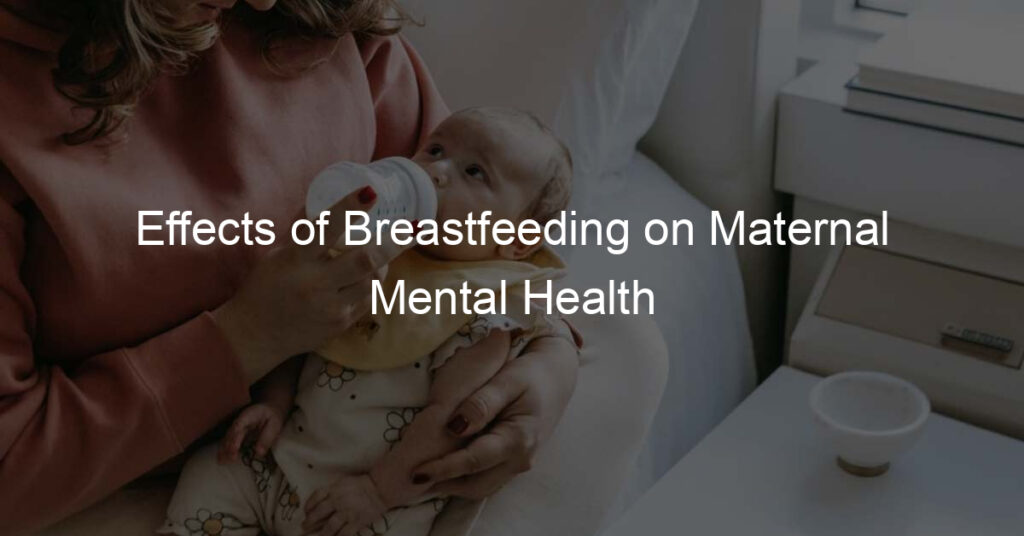It is well-established that breastfeeding has many benefits for both mother and child. But did you know that breastfeeding can also have a positive impact on maternal mental health?
In this blog post, we’ll explore the research on this topic and discuss some of the ways that breastfeeding can improve maternal mental health. We’ll also provide some tips for mothers who are struggling with mental health issues and may be considering whether or not to breastfeed. Read on to learn more!
What is the effect of breastfeeding on maternal mental health?
Breastfeeding is widely thought to be beneficial for the health of both the mother and the baby. It has been scientifically established that regular breastfeeding may help a mother’s mental health, especially if she experiences postpartum depression or anxiety.
Studies have shown that breastfeeding can increase levels of oxytocin and prolactin, which are hormones that are essential for maternal-infant bonding, relaxation, and stress reduction. Mothers who breastfeed have reported feeling calmer, more confident, balanced, and connected with their babies.
Furthermore, producing milk also releases endorphins which stimulate positive emotions in mothers leading to an improved sense of well-being. Therefore, it can be said that breastfeeding is a very important factor in maintaining good maternal mental health.
Breastfeeding causing postpartum depression
Many people are unaware of the potential link between breastfeeding and postpartum depression. Some mothers experience extreme discomfort, exhaustion, and stress during the first few months of breastfeeding their infants. This can affect their overall state of mental health, leading to a more serious case of postpartum depression.
Both medical professionals and mothers need to be aware of the signs and symptoms of PPD as they relate to breastfeeding as early detection is key in avoiding further mental health decline. Furthermore, putting proper measures in place such as additional support and assistance can help alleviate some of the intense pressure associated with nursing a baby.
With careful planning, preparation, and proactive management, mothers can enjoy their new babies while protecting their mental well-being.
Negative effects of breastfeeding on mom
One of the most amazing experiences for a parent is nursing their baby, but it can also come with some drawbacks. For starters, breastfeeding affects the health of mothers because it can deplete their energy stores quicker than before and they may not be able to get enough rest or sleep due to the constant needs of their hungry baby throughout the night.
It can often take considerable effort and dedication to keep up with regular, consistent nursing sessions. Furthermore, breastfeeding can sometimes cause pain if a woman has improperly fitted bras or if her infant has difficulty latching on. Additionally, a mother’s hormones fluctuate during extended breastfeeding which can lead to physical and emotional issues such as depression, fatigue, low libido, and even joint pain.
While these negative side effects should not detract from a mother’s decision to breastfeed, women must be aware of the potential challenges so they can make informed decisions before lactation.
When should I stop breastfeeding for mental health?
Deciding to stop breastfeeding for mental health can be difficult, but it is important to do what is best for you and your child. It can be beneficial to begin by talking with your child’s pediatrician about the pros and cons of continuing or stopping breastfeeding, as well as any other potential issues that may arise.
Additionally, speaking with a therapist can help in identifying if there are underlying mental health issues or lifestyle factors influencing your thinking around breastfeeding. Ultimately, parents must weigh their circumstances and decide what works best for their family.
If deemed necessary, stopping breastfeeding at any time is a perfectly acceptable choice if it will lead to a healthier emotional and mental state; however, it should always be done confidently and in consultation with experts if needed.
Psychological benefits of breastfeeding
Breastfeeding has many psychological benefits for both the mother and the baby. Studies have shown that breastfeeding increases the production of the hormone oxytocin, which helps to create an emotional bond between the mother and baby while also calming the nerves of each.
Research also indicates that women who breastfed are at a lower risk of developing postpartum depression, likely due to their elevated levels of oxytocin.
Finally, babies who are breastfed tend to demonstrate increased social awareness at an early age — suggesting improved communication skills — compared to those not breastfed. Not only is breastfeeding an important act for overall health purposes, but it can also have tremendous psychological implications!
Bringing it All Together: Effects of Breastfeeding on Maternal Mental Health
In conclusion, the effects of breastfeeding on maternal mental health are incredibly important. Even though many studies have helped us understand breastfeeding as a whole, there is still so much to learn when it comes to its incredible impact on maternal mental health.
The benefits are wide-reaching and span from improved moods and fewer depression symptoms to increased self-esteem, positive body image, and social support networks. These results point towards the need for better and more culturally appropriate breastfeeding education for all mothers, regardless of socio-economic status or background.
Breastfeeding should be supported by healthcare professionals and communities alike as a powerful way to improve not only maternal health but also infant wellbeing. Finally, more research needs to be done in these areas to fully understand the positive impact that breastfeeding can have on maternal mental health to inform public policy initiatives.














